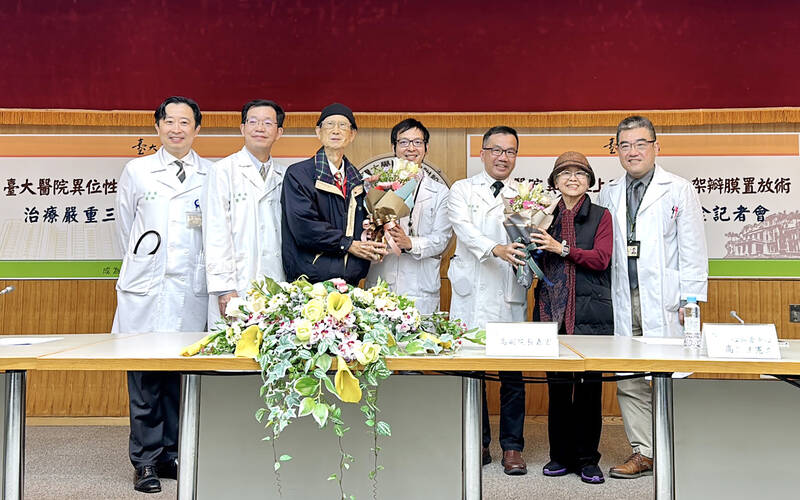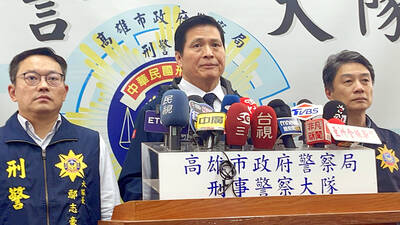A team at National Taiwan University Hospital (NTUH) has implanted the nation’s first TricValve transcatheter bicaval valve, on an 82-year-old man with a severe form of heart valve disease, the hospital said yesterday.
Chou (周) had chronic atrial fibrillation — which is when abnormal electrical impulses fire in the atria — that led to severe tricuspid regurgitation, a disorder in which a valve between heart chambers does not close tightly, and right-side heart failure, NTUH said.
Although he took medication for four years, it did not relieve his symptoms and his condition worsened this year, developing shortness of breath when walking and swelling in his legs and feet, it said.

Photo: CNA
One day the heart pain was so severe, he thought he might die, Chou said.
As he was unwilling to undergo open-heart surgery, a medical team at NTUH’s Cardiovascular Center suggested the new valve procedure, the hospital said.
The tricuspid valve controls the flow of blood from the heart’s right atrium (top chamber) to the right ventricle (bottom chamber), acting like a door to the heart, NTUH cardiology associate professor Lin Mao-hsin (林茂欣) said.
Tricuspid regurgitation can be caused by congenital heart defects, inflammation of the inner lining of the heart, trauma, chronic atrial fibrillation, pulmonary arterial hypertension or cardiac device implantation, he said.
People with mild tricuspid regurgitation usually do not experience symptoms, but severe cases might have shortness of breath, reduced exercise capacity and swelling of the legs, and it could progress to heart failure, ascites (fluid in the abdomen), jaundice and liver failure, Lin said.
The tricuspid valve repair procedure, an open-heart surgery, is a standard treatment, but some elderly patients with comorbidities might not want to take the risk, he said.
NTUH attending cardiology physician Chiang Jiun-Yang (江君揚) said the prevalence of tricuspid regurgitation in Taiwan is as high as about 60 percent, but most cases are mild and do not require treatment.
However, the prevalence of severe tricuspid regurgitation in people 65 or older is about 3 percent, and up to 5 or 6 percent are people in their 70s or 80s, Chiang said.
Before pursuing the TricValve transcatheter bicaval valve implantation, the team sent a proposal to the hospital ethics committee for review, and applied to the Food and Drug Administration (FDA) for special approval to import the device, Lin said.
The procedure involves implanting two bioprosthetic valves in the circulatory system — one in the superior vena cava and the other in the inferior vena cava — to reduce the backflow of blood and pressure, increase cardiac output, and improve a patient’s functional capacity and quality of life, he said.
It is a two-hour minimally invasive procedure done through a small incision in the groin, which does not require an extracorporeal membrane oxygenation life support system, and has a 94 percent success rate, he said.
The procedure is suitable for patients with severe tricuspid regurgitation, but who are at high risk or unsuitable for open heart surgery, he said.
It has been performed on more than 200 people around the world, but Chou is the first to receive it in Taiwan, he said.
However, as the TricValve transcatheter bicaval valve has not obtained an FDA medical device license, Chou had to pay about NT$1.3 million (US$41,236) out of pocket, he added.
Lu Hsi-yu (虞希禹), NTUH’s director of cardiovascular surgery, said an open-heart tricuspid valve repair procedure takes about three to six hours, and requires a couple days in the intensive care unit, followed by one to two weeks of recovery in a hospital.
Chou said he was able to leave the bed the next day and was even able to play table tennis with his friends one month after the surgery.

Twenty-four Republican members of the US House of Representatives yesterday introduced a concurrent resolution calling on the US government to abolish the “one China” policy and restore formal diplomatic relations with Taiwan. Led by US representatives Tom Tiffany and Scott Perry, the resolution calls for not only re-establishing formal relations, but also urges the US Trade Representative to negotiate a free-trade agreement (FTA) with Taiwan and for US officials to advocate for Taiwan’s full membership in the UN and other international organizations. In a news release announcing the resolution, Tiffany, who represents a Wisconsin district, called the “one China” policy “outdated, counterproductive

Actress Barbie Hsu (徐熙媛) has “returned home” to Taiwan, and there are no plans to hold a funeral for the TV star who died in Japan from influenza- induced pneumonia, her family said in a statement Wednesday night. The statement was released after local media outlets reported that Barbie Hsu’s ashes were brought back Taiwan on board a private jet, which arrived at Taipei Songshan Airport around 3 p.m. on Wednesday. To the reporters waiting at the airport, the statement issued by the family read “[we] appreciate friends working in the media for waiting in the cold weather.” “She has safely returned home.

ON PAROLE: The 73-year-old suspect has a criminal record of rape committed when he was serving in the military, as well as robbery and theft, police said The Kaohsiung District Court yesterday approved the detention of a 73-year-old man for allegedly murdering three women. The suspect, surnamed Chang (張), was arrested on Wednesday evening in connection with the death of a 71-year-old woman surnamed Chao (趙). The Kaohsiung City Police Department yesterday also unveiled the identities of two other possible victims in the serial killing case, a 75-year-old woman surnamed Huang (黃), the suspect’s sister-in-law, and a 75-year-old woman surnamed Chang (張), who is not related to the suspect. The case came to light when Chao disappeared after taking the suspect back to his residence on Sunday. Police, upon reviewing CCTV

TRUMP ERA: The change has sparked speculation on whether it was related to the new US president’s plan to dismiss more than 1,000 Joe Biden-era appointees The US government has declined to comment on a post that indicated the departure of Laura Rosenberger as chair of the American Institute in Taiwan (AIT). Neither the US Department of State nor the AIT has responded to the Central News Agency’s questions on the matter, after Rosenberger was listed as a former chair on the AIT’s official Web site, with her tenure marked as 2023 to this year. US officials have said previously that they usually do not comment on personnel changes within the government. Rosenberger was appointed head of the AIT in 2023, during the administration of former US president Joe